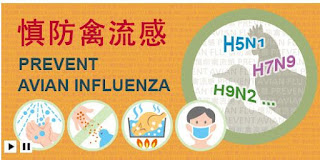 |
| Credit HK CHP |
#12,324
After announcing much larger numbers in January and February, the weekly tallies of H7N9 cases reported by Mainland China have dropped into the low 20's for three weeks running. Based on the numbers reported to date, Mainland China has detected a record 522 cases since this 5th wave began in October.
Eight additional cases (7 imported) have been recorded this winter by Hong Kong (5), Macao (2), and Taiwan (1), bringing the total reported to 530 cases.
Unknown are how many unrecognized mild, moderate, or asymptomatic infections that may have occurred, as only those sick enough to be hospitalized are likely to be tested (see Beneath The H7N9 Pyramid).
Today's notification from the NHFPC is fairly light on details, but once again we see that cases are skewed heavily towards males (95%), and all are over the age of 30 (median age has remained in the mid-50s).
This age shift towards older (male) patients is something we've seen consistently with H7N9 since it emerged in 2013, in stark contrast to the demographics of the first 600+ H5N1 cases reported between 1997 and 2013 (median age 18, 54% female - cite 2014 PLoS One).
We can expect a more detailed report on these 21 cases next week when Hong Kong releases their 11th avian influenza weekly report for 2017.
The Centre for Health Protection (CHP) of the Department of Health today (March 17) received notification from the National Health and Family Planning Commission that 21 additional human cases of avian influenza A(H7N9), including four deaths, were recorded from March 10 to 16. The CHP strongly urges the public to maintain strict personal, food and environmental hygiene both locally and during travel.
The 19 male and two female patients, aged from 33 to 77, had their onset from February 28 to March 13. The cases were six cases from Guangxi, five cases in Hunan, three cases each from Guangdong and Guizhou, two cases in Henan and one case each from Jiangxi and Fujian. Among them, 18 were known to have exposure to poultry or poultry markets.
Travellers to the Mainland or other affected areas must avoid visiting wet markets, live poultry markets or farms. They should be alert to the presence of backyard poultry when visiting relatives and friends. They should also avoid purchase of live or freshly slaughtered poultry, and avoid touching poultry/birds or their droppings. They should strictly observe personal and hand hygiene when visiting any place with live poultry.
Travellers returning from affected areas should consult a doctor promptly if symptoms develop, and inform the doctor of their travel history for prompt diagnosis and treatment of potential diseases. It is essential to tell the doctor if they have seen any live poultry during travel, which may imply possible exposure to contaminated environments. This will enable the doctor to assess the possibility of avian influenza and arrange necessary investigations and appropriate treatment in a timely manner.
While local surveillance, prevention and control measures are in place, the CHP will remain vigilant and work closely with the World Health Organization and relevant health authorities to monitor the latest developments.
The CHP's Port Health Office conducts health surveillance measures at all boundary control points. Thermal imaging systems are in place for body temperature checks on inbound travellers. Suspected cases will be immediately referred to public hospitals for follow-up.
The display of posters and broadcasting of health messages in departure and arrival halls as health education for travellers is under way. The travel industry and other stakeholders are regularly updated on the latest information.
The public should maintain strict personal, hand, food and environmental hygiene and take heed of the advice below while handling poultry:
- Avoid touching poultry, birds, animals or their droppings;
- When buying live chickens, do not touch them and their droppings. Do not blow at their bottoms. Wash eggs with detergent if soiled with faecal matter and cook and consume them immediately. Always wash hands thoroughly with soap and water after handling chickens and eggs;
- Eggs should be cooked well until the white and yolk become firm. Do not eat raw eggs or dip cooked food into any sauce with raw eggs. Poultry should be cooked thoroughly. If there is pinkish juice running from the cooked poultry or the middle part of its bone is still red, the poultry should be cooked again until fully done;
- Wash hands frequently, especially before touching the mouth, nose or eyes, before handling food or eating, and after going to the toilet, touching public installations or equipment such as escalator handrails, elevator control panels or door knobs, or when hands are dirtied by respiratory secretions after coughing or sneezing; and
- Wear a mask if fever or respiratory symptoms develop, when going to a hospital or clinic, or while taking care of patients with fever or respiratory symptoms.
The public may visit the CHP's pages for more information: the avian influenza page, the weekly Avian Influenza Report, global statistics and affected areas of avian influenza, the Facebook Page and the YouTube Channel.Ends/Friday, March 17, 2017Issued at HKT 17:50